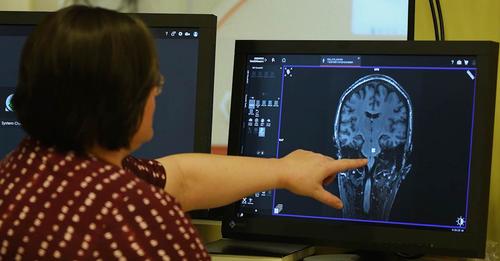Auburn research center renamed with renewed focus on neuroimaging
A major research center within Auburn’s Samuel Ginn College of Engineering has been renamed the Auburn University Neuroimaging Center to highlight its renewed focus on solving critical neurological health challenges.
The center — headquartered in the Thomas Walter MRI Research Building in the Auburn Research Park — is focused on advancing the latest in neuroscience research and leveraging the university’s expertise in engineering, sciences and veterinary medicine with the use of advanced magnetic resonance imaging.
On Friday, members of the Auburn University Board of Trustees watched a video that touted the center’s capabilities.
“Our vision is to become a leading center for MRI research with emphasis on brain imaging, cardiovascular imaging, orthopedic imaging and coil design,” said Thomas Denney, director of the Auburn University Neuroimaging Center and the Mr. & Mrs. Bruce Donnellan & Family Endowed Professor in electrical and computer engineering. “These areas represent an intersection between the needs of the MRI research community and existing expertise and strengths of Auburn University.”
The center will allow the university to expand its groundbreaking brain research, among other capabilities, through the MRI devices at the site and the academic and research prowess of Auburn faculty.
“I dreamed of building an MRI research program here at Auburn where large medical centers recognize our contributions,” Denney said. “Through research, Auburn University has moved the needle and more than exceeded my expectations. Since opening this building, we’ve been able to double our staff. Those (MRI) machines are great, but people are the ones who write research papers and people are the ones who earn those research grants. The university is sitting on a gold mine in terms of data and capabilities.”
Approximately 90 percent of the images processed at the center focus on the brain.
“The neuroimaging center is a blessing to my practice and to our student-athletes because we literally use it on a daily basis, including the weekend,” said Michael Goodlett, chief medical officer and team physician for Auburn Athletics. “It gets us back to play quicker because not all injuries are surgical, and this definitely helps us determine very quickly in the course what’s surgical and what’s not surgical.”
Jennifer Robinson, professor of psychological sciences, said her research work also has benefited greatly from the center.
“I’m particularly focused on the interaction between cognition and emotion,” she said. “So, disorders like post-traumatic stress disorder are of great interest to me. And then also just knowing how much that can help our soldiers and folks that have experienced PTSD.”
New research explorations already underway include, but are not limited to:
- Meredith Reid, assistant professor in electrical and computer engineering, who is exploring post-traumatic stress disorder biomarkers in senior adults via spectroscopy.
- Adil Bashir, associate professor in electrical and computer engineering, who is studying muscle and brain energy production capacity on the cells and determining mitochondrial metabolic homeostasis by utilization of phosphorus spectroscopy.
- Gopikrishna Deshpande, professor in electrical and computer engineering, who is examining how artificial intelligence can be used to predict brain disorders and human/animal behavior using information from brain networks obtained from MRI.

Meredith Reid, assistant professor in electrical and computer engineering, is exploring post-traumatic stress disorder biomarkers in senior adults via spectroscopy.
Categories: Health Sciences, Engineering
Back to Articles




